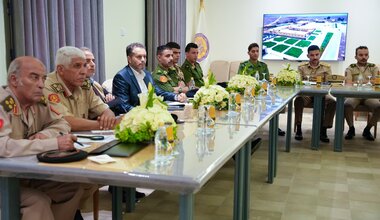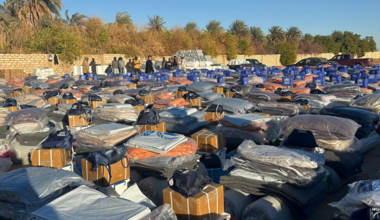Candidates Learn The Ways and Means of Constitution Drafting
As a teacher at a primary school in Benghazi, Khadeeja MohammedAl Amami is well-acquainted with lecturing. On a daily basis, she challenges her students to learn new things and work together. But for one day this month, she found herself behind a desk, halfway across the country, taking notes and being encouraged to confront new topics with peers.
In Tripoli for a training workshop, Mrs. Al Amami, a candidate in the 20 February 2014 elections for Libya’s Constitution-Drafting Assembly (CDA), is grappling with difficult questions about the elements of a democratic constitution. She is crystal clear about why she is undertaking this unconventional journey.
“My motivation is my brother and my nephew, who were martyrs during the revolution,” explains Mrs. Al Amami, flanked by her 16-year old son, who accompanied her to Tripoli.
“When they went against the old regime, they just wanted Libya to be a better country. I am doing this because I want to represent their voices, to guarantee that Libya will in fact be a better country.”
Mrs. Al Amami was joined in Tripoli by 350 other candidates for a series of “Inclusive Constitution” training workshops organized by the United Nations Development Programme (UNDP) in Libya in partnership with the United Nations Support Mission in Libya (UNSMIL). These workshops were part of the UN’s continued efforts to support Libyan actors and provide technical support in the country’s democratic transition. Thirty-nine of the participants were women, 60 percent of the 64 female CDA candidates.
For Ali Albadawi, an employee at the Water and Sewage Authority, also from Benghazi, the motivation to run for the 60-member CDA and participate in these trainings comes from a group of citizens he has come to represent.
“I am motivated by the disability I have,” he says, holding the two crutches he needs in order to walk.
“It is very important for there to be a representative of the disabled in the CDA, so he can guarantee that they won’t look at us with sympathy, as people to take care of – but that they look at our issues from a rights perspective.”
Throughout several one-day intensive programs, the trainings provided candidates with an introduction to different kinds of constitutions and political systems, the topic of human rights in constitutions, and the process of constitution-drafting. Evening seminars provided additional focus on issues related to gender in constitutions.
With the help of trainers, all Arabic-speaking legal experts from throughout the region, the candidates considered what makes a constitution democratic and how a constitution can guarantee individual rights.
These are just some of the difficult questions that will soon stare down the successful candidates of the CDA elections. On 20 February, Libyan voters will elect representatives to serve in this body, which will then have to draft a constitution to be put to a popular vote.
“The constitution is the framework of the social contract between Libya and its people, with the ultimate aim of providing political stability and social justice,” said Eric Overvest, UNDP Country Director in Libya, as part of his introduction to the trainings. He also emphasized the importance of supporting both the CDA and civil society, as public participation in the process is critical to ensure a high level of national ownership and inclusiveness in the constitution.
Using potential scenarios and real-life examples from other countries, the trainers pushed the participants, hailing from all over Libya, to apply theoretical concepts to practice. In doing this, the workshop provided a unique opportunity to meet other candidates and discuss critical issues with constitutional experts from other countries.
“We benefited a lot,” said Dr. Abeid Salem Bulasaad, a professor at Sabha University and candidate running for a seat in Shathi.
“I
 United Nations Peacekeeping
United Nations Peacekeeping UN
UN












